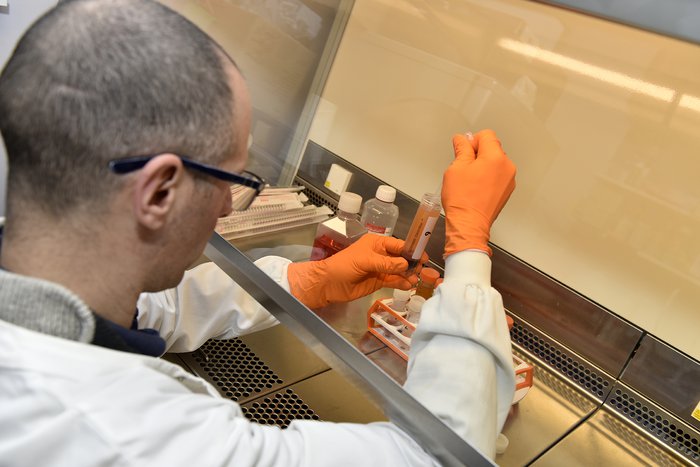Coronavirus vaccine: will it help people with blood cancer?
United Kingdom
How much hope should people with blood cancer pin on a coronavirus vaccine?

For many people in the blood cancer community, coronavirus has meant being indoors for months on end, and a change to life as they once knew it. There’s been a lot of speculation in the media about whether a coronavirus vaccine will bring an end to this pandemic.
People with blood cancer have the most to gain from an end to this pandemic because their disease puts them at a greater risk of serious illness from coronavirus – but how much hope should they have for a vaccine?
Vaccines are the most effective ways to protect against disease. There are different ways of making vaccines, but they all work in similar ways. Doctors inject people with tiny amounts of a harmless form of a virus and our bodies respond by making antibodies that can attack this. Antibodies are proteins produced by the immune system to fight viruses, bacteria and other harmful ‘intruders’.
Normally, it takes years to get a vaccine to the stage where it can be trialled. But the urgency of the coronavirus pandemic has meant everything has been fast-tracked, and research teams have managed to do this in a matter of months.
Most of these antibodies can remember what they’ve seen in the past, so they can respond in a similar way in the future. This is the aim of vaccines: we want the body to produce antibodies against a harmless version of the virus. This means that if a person were to come into contact with an infectious form of the virus, the body would quickly produce these antibodies to attack the virus and stop them from becoming sick.
There's a massive global effort using various approaches in search of a vaccine that protects people against coronavirus. As I’m writing this blog, almost 150 vaccines are in development, and 19 are already being used in clinical trials in people. Visit the Parliamentary Office of Science and Technology's website for their latest research analysis into coronavirus.
The speed is astonishing. Normally, it takes years to get a vaccine to the stage where it can be trialled. But the urgency of the coronavirus pandemic has meant everything has been fast-tracked and research teams have managed to do this in a matter of months. It’s an impressive start, but it’s likely that many of these vaccines won’t work. While it’s likely that we’ll find a vaccine that works to some extent, we can’t be certain. If we don’t get a vaccine, testing and tracing the virus and localised lockdowns will be vital going forward.
There are two clinical trials in the UK looking at the effectiveness of vaccines against coronavirus, both of which are considered promising.
Oxford University trial
The first trial is being run by Oxford University and is looking into the effectiveness of a vaccine called ChAdOx1 nCoV-19. More than 2,000 people have already been enrolled in this trial. This vaccine is made from a weakened version of a virus that causes the common cold. Researchers have attached genes onto the virus, causing it to express (make) the same proteins as coronavirus. They hope the immune system will mount a response against these proteins, which will then prevent infection from coronavirus.
What are the next steps in this trial?
On Monday 20th July, researchers published the initial results of this clinical trial for this vaccine. The initial trial, which involved over 1,000 people, appeared promising and showed that people make antibodies and other immune cells called T cells which can fight coronavirus, following vaccination.
The study is ongoing and now needs to understand how long this immune response will last for. They hope the immune system will mount a response against these proteins, which will then prevent infection from coronavirus in the future.
Imperial College London trial
The second trial is being run by Imperial College London and uses a different method. This vaccine includes bits of genetic code involved in making coronavirus a functioning virus. Once injected, this code should tell our cells to produce copies of a protein found on the surface of the coronavirus. This should train the immune system to respond to the virus if it were to become infected in the future.
What are the next steps in this trial?
On the 17th July, it was announced that the Imperial study will move into the next phase of clinical trials in humans. More than 100 people are being recruited to the study.
Despite Oxford and Imperial seeming to be in competition with each other, the teams are actually working closely together. They think it’s likely that both vaccines will be needed and used together.
Of all the vaccines in development around the world, we hope that one of these trials will provide protection against coronavirus. Currently, we don’t know which one will work best.
In the UK, despite Oxford and Imperial seeming to be in competition with each other, the teams are actually working closely together. They think it’s likely that both vaccines will be needed and used together if they’re both shown to work.
This is because although the Oxford vaccine has been shown to create good immunity against the coronavirus to start with, researchers are unsure how long this will last. It could be that the Imperial vaccine is used as an immunity ‘booster’.
If you have blood cancer, you might have been told not to have certain types of vaccine. This is because people with compromised immune systems can’t have ‘live vaccines’ as there can be a small chance that these can cause serious infection. Other types of vaccine that are not live, such as the flu vaccine, are fine for people with blood cancer to receive.
The Oxford University vaccine being trialled is an example of a ‘non-replicating viral vector’ vaccine, which does not include live virus. However, it contains bits of the coronavirus stuck to another harmless virus, which our bodies should mount an immune response to. This type of vaccine should be fine to give people with blood cancer.
The Imperial vaccine is an example of an ‘RNA’ vaccine that involves vaccinating people with part of the genetic code of coronavirus. This helps the body to mount an immune response. Like the Oxford vaccine, this does not contain live virus, so it should be safe for people with blood cancer.
As people with blood cancer tend to have weaker immune systems, it’s harder to mount a response to a vaccine – which can make the vaccine less effective.
Whether someone can receive the vaccine may also depend on what treatment they’re on. Many treatments given to people with blood cancer can weaken the immune system. This means it may not be appropriate to give people vaccines while they’re on treatment. It may be better to wait until their treatment has ended, as it would be at this point that the vaccine would offer most protection.
People with blood cancer often have compromised immune systems. As their immune systems are weaker, it’s harder to mount a response to a vaccine – which can make the vaccine less effective. This doesn’t mean their immune systems won’t respond to vaccination, but it’s likely the response won’t be as good as in someone without blood cancer.
Generally, we know that the older you are, the less effective vaccines will be. As many people with blood cancer tend to be older, it’s likely that the vaccine will be less effective. Having said that, if the vaccine does boost immunity against coronavirus, even if it is less effective, it should still be prioritised for people with compromised immune systems. This is because it would still offer some protection.
If a vaccine is shown to be successful, and assuming it’s safe for people with blood cancer, it would make sense that they should be among the first to receive it. This is because they are considered most vulnerable from coronavirus.
As it stands, the Government has said that frontline NHS workers and people deemed to be at high risk from coronavirus are the two ‘priority vaccine groups’. Therefore, we’d hope that people with blood cancer would receive a vaccine first.
Having said that, it will take some time before we know how much protection a vaccine offers to people with blood cancer. It may take months, and for a wider group of people to be vaccinated, before life can go back to normal.
Even if a vaccine did not offer people with blood cancer as much protection as we'd hope, it could still stop them from getting coronavirus. If a vaccine programme is rolled out, most of the population would be protected from coronavirus and therefore people with blood cancer would have a much reduced risk of contracting it.
This is what happened with measles. Once enough people had been given the measles vaccine, infection levels dropped dramatically. It became very rare for the virus to transmit from person to person, leading measles to be declared as effectively ‘eliminated’. Something similar could happen with a coronavirus vaccine. If healthy people are given the vaccine, they could protect the most vulnerable people from contracting the virus from them.
We’ll keep monitoring how things progress over the coming months and will continue to update you as and when we know more.

Want to read more stories like this?
Join our mailing list to get stories like this delivered directly to your inbox every month.

